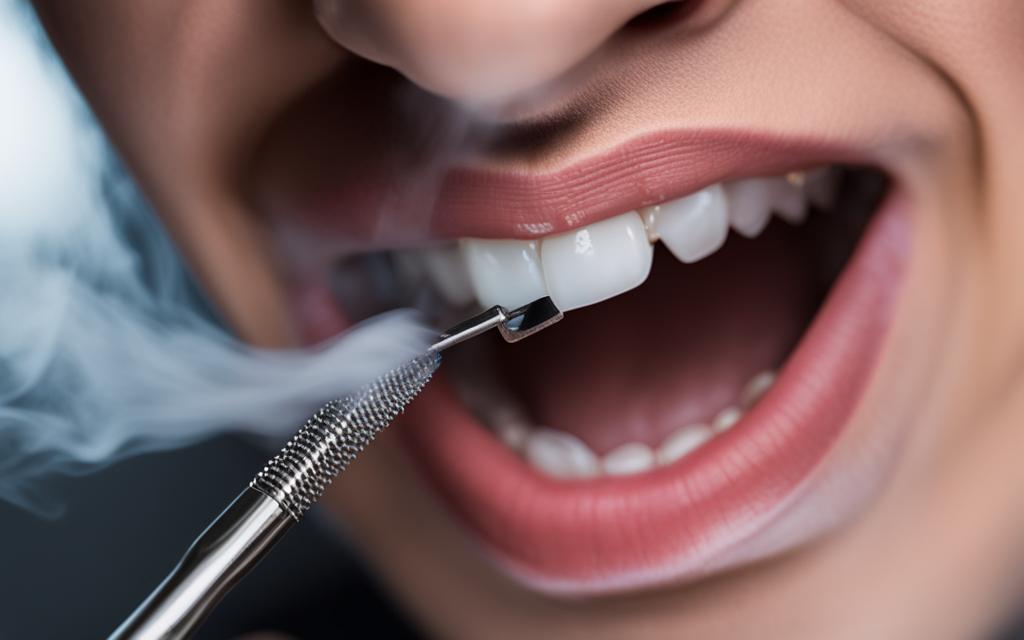Are you wondering if your dentist can detect if you vape while wearing braces? The answer is yes! Your dentist has the expertise to identify signs of vaping, even if you don’t disclose that information. When it comes to orthodontic treatment, it’s essential to be transparent about your habits so that your dentist can provide the appropriate care for your dental health.
Table of Contents
Toggle- The Effects of Vaping on Dental Health
- How Dentists Identify Vaping Habits
- Conclusion
- FAQ
- Can a dentist tell if you vape with braces?
- What are the effects of vaping on dental health, especially when you have braces?
- How do dentists identify vaping habits when a person is wearing braces?
- How important is it to inform your dentist and orthodontist about your vaping habits if you have braces?
- Related posts:
Key Takeaways:
- Vaping with braces can have negative effects on your dental health, including tooth discoloration and an increased risk of gum disease.
- Dentists can detect signs of vaping by observing dry mouth, gum inflammation, and bacterial plaque accumulation, among other indications.
- Being honest with your dentist about your vaping habits is crucial to ensure proper treatment and prevent potential oral health issues.
- Vaping can interfere with the progress of orthodontic treatment and affect the alignment of your teeth.
- By maintaining open communication with your dentist and orthodontist, you can receive the necessary guidance for maintaining a healthy smile.
The Effects of Vaping on Dental Health
Vaping can have negative effects on your dental health, especially when you have braces. The nicotine and other chemicals in e-cigarettes can stain your teeth and contribute to gum disease. Vapes that use flavored aerosols can increase the likelihood of bacteria adhering to your teeth, leading to tooth decay. Additionally, the reduced saliva flow caused by vaping can increase the risk of cavities and gum problems. Vaping with braces can also interfere with orthodontic treatment by affecting the alignment of your teeth.
It’s essential to inform your dentist and orthodontist about your vaping habits so they can provide appropriate care and address any oral health issues.

| Effect | Description |
|---|---|
| Teeth stains | Nicotine and chemicals in e-cigarettes can cause discoloration |
| Gum disease | Vaping can contribute to gum inflammation and infection |
| Tooth decay | Flavored aerosols increase the risk of bacteria sticking to the teeth |
| Reduced saliva flow | Vaping decreases saliva production, leading to an increased risk of cavities |
| Orthodontic interference | Vaping can affect the alignment of teeth, interfering with braces’ effectiveness |
By being honest about your vaping habits, your dentist can better diagnose and treat any oral health issues that may arise. They have the knowledge and expertise to distinguish between the effects of vaping and other oral health concerns, allowing them to provide appropriate care and guidance.
How Dentists Identify Vaping Habits
When it comes to detecting vaping habits, dentists have the necessary expertise to identify the signs and symptoms associated with vaping, especially in patients wearing braces. By closely examining the oral cavity, dentists can determine whether a person has been vaping, based on several key indicators.
- Nicotine Stains: Dentists can detect nicotine stains on the teeth, which can be a strong indication of vaping with braces.
- Dry Mouth: Vaping can result in dry mouth, a common side effect caused by the ingredients in e-cigarettes.
- Cracked or Split Tongue: Vaping can lead to a cracked or split tongue, which is often observed in individuals who have been vaping.
- Bacterial Plaque Accumulation: Vaping can contribute to an increase in bacterial plaque accumulation, leading to oral health issues.
- Bad Breath: Vaping can cause bad breath due to the chemicals and substances present in e-cigarettes.
- Tooth Decay: Dentists can identify signs of tooth decay, which can be attributed to the effects of vaping.
- Gum Inflammation: Vaping can also result in gum inflammation, which can be a clear indicator of vaping habits.
- Weakening of Tooth Enamel: The chemicals present in e-cigarettes can weaken tooth enamel, leading to increased dental sensitivity.
These oral signs and symptoms, when combined with other risk factors such as the presence of braces, can strongly suggest that a person has been vaping. Dentists have the knowledge and experience to distinguish between the effects of vaping and other oral health issues, allowing them to provide appropriate treatment and guidance to patients.
In conclusion, dentists play a crucial role in identifying vaping habits by carefully examining the oral cavity for signs such as nicotine stains, dry mouth, cracked or split tongue, bacterial plaque accumulation, bad breath, tooth decay, gum inflammation, and weakening of tooth enamel. By understanding these indicators, dentists can provide the necessary support and treatment to patients who vape with braces, ensuring their oral health needs are addressed effectively.
To better understand how dentists identify vaping habits, here’s a table summarizing the key signs they look for:
| Signs of Vaping with Braces |
|---|
| Nicotine Stains |
| Dry Mouth |
| Cracked or Split Tongue |
| Bacterial Plaque Accumulation |
| Bad Breath |
| Tooth Decay |
| Gum Inflammation |
| Weakening of Tooth Enamel |
Conclusion
Dentists possess the expertise to identify signs of vaping with braces based on the oral manifestations that vaping can cause. Tooth discoloration, gum disease, dry mouth, and bacterial changes are among the indications they can observe. Being truthful with your dentist about your vaping habits is crucial, as it enables them to offer the appropriate treatment and care for your dental health.
Vaping with braces can have detrimental effects on your oral health, including an increased risk of tooth decay and potential interference with orthodontic treatment. By maintaining open communication with your dentist and orthodontist, you can ensure that your oral health needs are effectively addressed.
If you are vaping with braces, it is important to understand the potential consequences and take necessary measures to maintain good oral hygiene. Regular dental check-ups and cleanings are essential for monitoring any impacts on your dental health and preventing further complications. Your dentist can provide personalized guidance and recommendations to ensure the best possible outcomes for your oral health while wearing braces and vaping.
FAQ
Can a dentist tell if you vape with braces?
Yes, a dentist has the ability to detect signs of vaping with braces. They can observe certain indications in your mouth that suggest you’ve been vaping, even if you don’t disclose that information.
What are the effects of vaping on dental health, especially when you have braces?
Vaping can have negative effects on dental health, especially when you have braces. The nicotine and other chemicals in e-cigarettes can stain your teeth and contribute to gum disease. Vapes that use flavored aerosols can increase the likelihood of bacteria adhering to your teeth, leading to tooth decay. Additionally, the reduced saliva flow caused by vaping can increase the risk of cavities and gum problems. Vaping with braces can also interfere with orthodontic treatment by affecting the alignment of your teeth.
How do dentists identify vaping habits when a person is wearing braces?
Dentists can identify vaping habits by examining the oral signs and symptoms associated with vaping. They can detect nicotine stains on the teeth, dry mouth, cracked or split tongue, bacterial plaque accumulation, bad breath, tooth decay, gum inflammation, and weakening of tooth enamel. These indications suggest that a person has been vaping, especially when combined with other risk factors such as the presence of braces. Dentists have the expertise to distinguish between the effects of vaping and other oral health issues, allowing them to provide appropriate treatment and guidance.
How important is it to inform your dentist and orthodontist about your vaping habits if you have braces?
It is important to inform your dentist and orthodontist about your vaping habits if you have braces. This information can help them provide appropriate treatment and care for your dental health. Vaping with braces can have negative effects on oral health, including an increased risk of tooth decay and interference with orthodontic treatment. By maintaining open communication with your dentist and orthodontist, you can ensure that your oral health needs are addressed effectively.

